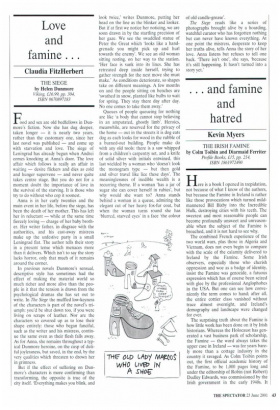Love and famine . . .
Claudia FitzHerbert
THE SIEGE by Helen Dunmore Viking £16.99, pp. 304, ISBN 0670897183 Food and sex are old bedfellows in Dunmore's fiction. Now she has dug deeper, taken longer — it is nearly two years, rather than the customary one, since her last novel was published — and come up with starvation and love. The siege of Leningrad has already begun when Andrei comes knocking at Anna's door. The love affair which follows is really an affair in waiting — desire flickers and dies as cold and hunger supervene — and never quite takes centre stage. But you do not for a moment doubt the importance of love in the survival of the starving. It is those who try to do without who cop it soonest.
Anna is in her early twenties and the main event in her life, before the siege, has been the death of her mother. This has left her in reluctant — while at the same time fiercely loving — charge of her baby brother. Her writer father, in disgrace with the authorities, and his cast-away mistress make up the unfestive party in a small Leningrad flat. The author tells their story in a present tense which menaces more than it delivers. Which isn't to say the story lacks horror, only that much of it remains around the corner.
In previous novels Dunmore's sensual, descriptive style has sometimes had the effect of making the material world so much richer and more alive than the people in it that the tension is drawn from the psychological dramas she has set out to write. In The Siege the muffled low-keyness of the characters is part of the novel's triumph: you'd be shut down too, if you were living on scraps of leather. Nor are the characters so covered up as to lose their shape entirely: those who began fanciful, such as the writer and his mistress, continue the same even as their flesh falls away. As for Anna, she remains throughout a typical Dunmore heroine, on the cusp of dutiful joylessness, but saved, in the end, by the very qualities which threaten to drown her in grimness.
But if the effect of suffering on Dunmore's characters is more confirming than transforming, the opposite is true of the city itself. 'Everything makes you blink, and look twice,' writes Dunmore, putting her head on the line as the blinker and looker. But if at first we notice her noticing, we are soon drawn in by the startling precision of her gaze. We see the swaddled statue of Peter the Great which 'looks like a handgrenade you might pick up and hurl towards the enemy'. We see an old woman sitting resting, on her way to the station. 'Her face is sunk into its lines. She has retreated deep inside herself, trying to gather strength for the next move she must make.' As conditions deteriorate, so shapes take on different meanings. A few months on and the people sitting on benches are 'swathed in snow, planted like bulbs to wait for spring. They stay there day after day. No one comes to take them away.'
Queues of people queueing for nothing are like 'a body that cannot stop believing in an amputated, ghostly limb'. Heroics, meanwhile, are reserved for the privacy of the home — out in the streets it is dog eats dog as each looks for wood in the rubble of a burned-out building. People make do with any old tools: there is a saw whipped from a children's carpentry set, and a knife of solid silver with initials entwined, this last wielded by a woman who 'doesn't look the monogram type — but then gold and silver travel like lice these days'. The meaninglessnes of inedible wealth is a recurring theme. If a woman 'has a jar of sugar she can cover herself in rubies', but why would she want to? Anna stands behind a woman in a queue, admiring the elegant cut of her heavy fox-fur coat, but when the woman turns round she has 'blurred, starved eyes' in a face 'the colour
of old candle-grease'.
The Siege reads like a series of photographs brought alive by a hoarding, watchful curator who has forgotten nothing but can never have known everything. At one point the mistress, desperate to keep her truths alive, tells Anna the story of her love. Anna listens but refuses to tell one back. 'There isn't one', she says, 'because it's still happening. It hasn't turned into a story yet.'


































































 Previous page
Previous page